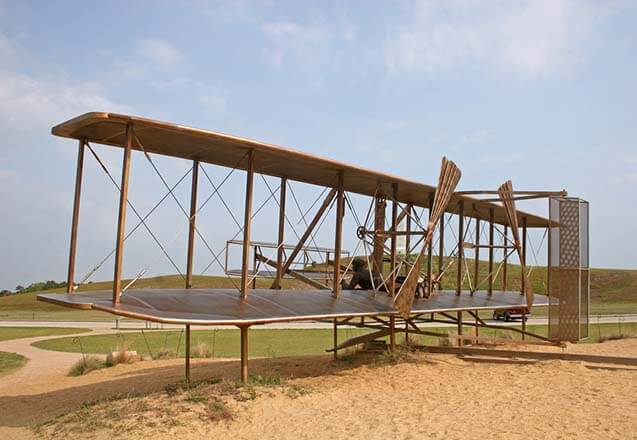Ricochet is the best place on the internet to discuss the issues of the day, either through commenting on posts or writing your own for our active and dynamic community in a fully moderated environment. In addition, the Ricochet Audio Network offers over 50 original podcasts with new episodes released every day.
 112 Years of Heavier-than-Air Flight
112 Years of Heavier-than-Air Flight
 It’s not an anniversary ending in a five or a zero, but 112 years ago today, a couple bicycle mechanics took off in a powered box kite on some windy dunes in North Carolina, successfully landed it, and started the era of aviation.
It’s not an anniversary ending in a five or a zero, but 112 years ago today, a couple bicycle mechanics took off in a powered box kite on some windy dunes in North Carolina, successfully landed it, and started the era of aviation.
On the centennial of the event 12 years ago, I had essays at TechCentralStation (which no longer exists) and National Review, in which I noted that their big achievement wasn’t in taking off, but in landing. Also, on Fox News, I compared and contrasted the government versus the private sector, and noted that the space program needed the Wright stuff:
In Greek mythology, it was said that Minerva sprung fully formed, in full armor, from the head of Zeus.
Unfortunately, that often seems to be the goal of government agencies as well. A long, drawn-out program, with many incremental tests, offers many opportunities for test failures with their attendant bad publicity and potential for embarrassing congressional hearings. Moreover, the risk of such failures is increased if there is inadequate analysis before committing to hardware — hardware made all the more expensive by attempting to minimize the risk of failure, thus making any possible failure more expensive as well.
This leads to a vicious cycle of spending money to prevent failure which in turn increases the cost of the failure, which in turn results in further expenditures of funding for analysis and increased reliability, which in turn…
The space program still needs the Wright stuff. And I think these articles hold up surprisingly well.
Published in Technology



Athena sprang from Zeus’ head. Minerva sprang from Jupiter’s head.
According to legend, in a competition with Poseidon, Athena gave Athens the olive tree, while Poseidon offered a spring of salt water from a mountainside. As a result, the city named itself for Athena.
Seawriter
Picky picky picky. Latin is all Greek to me.
Meh, insects beat us by like 400 million years.
Sorry. The things you pick up when you date a Classical Civilizations major in college…
Thanks, Rand, for the post. It’s good to be reminded of the awesome accomplishment of flight. My job involves connecting people to their flights, to Mumbai through Dubai; from Spokane to Milwaukee; from Seattle to–wherever in our world they wish to go. I often watch ‘heavies’ lift off, to Frankfurt, to Amsterdam, to LAX onward to New Zealand…and the sight never fails to fill me with awe. And all this is taken for granted. Astonishing journeys that a scant century past would have been one-way gambles of one’s entire life.
My paternal grandmother could remember seeing the first airplane to fly over Ireland, probably in 1910. How much the human imagination can realize!
66 years from Kitty Hawk to Tranquility Base. 46 years from Tranquility Base and we’re paying the Russians to take us into low earth orbit. Go figure.
Give it another 20 years and we will be 66 years from putting another man into orbit.
Seawriter
Orville and Wilbur were uncredentialed tinkerers who rejected the scientific consensus and proved it wrong.
Imagine that.
Actually, no they did not. They accepted the scientific consensus as to the physics involved. They succeeded because they understood the physics involved in controlling a vehicle in flight better than anyone else (and also understood the power requirements better). They were uncredentialed, but very few were back then. (The highest degree Samuel Langley, the “expert” on aeronautics had was a high school degree from English High School in Boston. He was a professor despite lacking other degree credentials.)
Like many from the 19th century, the Wrights were uncredentialed, but highly educated. I’d say they understood the mathematics involved better than Langley.
What the Wrights rejected was the consensus of so-called experts (like Langley) when their consensus contradicted observation and common sense. Kind of like the consensus of today’s credentialed experts on AGW.
Interesting, thanks.